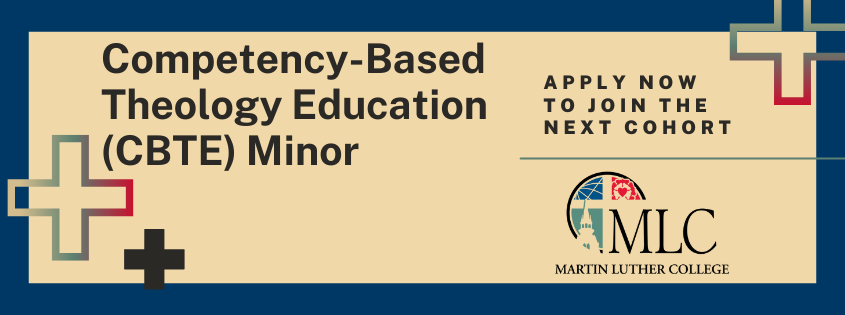CBTE – What Does That Mean?
/in Nontraditional Education News /by lagrownaAcronyms are pretty prevalent across the synod and our campus. LES? Lutheran Elementary School. ALHS? Area Lutheran High School. BIC? Bible Information Class. DP? District President.
As we build our CBE (competency-based education) programming at MLC (Martin Luther College), we are adding a few new acronyms to our WELS (Wisconsin Evangelical Lutheran Synod) vocabulary.
If you have spent any time on our webpage, you will have seen CBTE. Our first approved competency-based program is the CBTE Minor. While our CBTE Minor is uniquely framed to meet MLC’s institutional mission, CBTE is not something we devised. The international Competency-Based Theological Education movement reflects over a decade of work in rethinking how seminaries, colleges, and universities support the theological education of those preparing to serve in the ministries of various church bodies.
The International CBTE Community of Practice defines seven key practices that distinguish CBTE from traditional methods of theological training. We’ve used these seven guiding principles to develop MLC’s CBTE Minor.
Contextual Learning
Developing returning adult learners for ministry necessitates that they are involved in ministry. Going beyond an internship that constitutes part of their degree program, most CBTE learners are immersed full-time in their ministry environment. Assignments and learning opportunities are outcomes-based and, therefore, can be adapted to fit and contribute to the learner’s ministry context.
Partnered Investment
Having learners immersed in a ministry environment transforms the program from being primarily a service contract between the learners and the institution to being a partnership in developing leaders between the institution, the learner, and their congregational school.
Team-Based Mentoring
Diverse mentor teams are engaged to holistically develop learners. They work as a team to develop students in all areas of their lives. Mentor teams at MLC include:
-
- A faculty mentor – an MLC faculty mentor who connects the learner with MLC resources
- The CBTE faculty – the individuals who actively engage with the learners in their year-long study, and
- A practitioner mentor – an on-the-ground mentor from the learner’s ministry context
Integrated Outcomes
To ensure holistic development, the program is designed with integrated outcomes that aim to develop learners in all areas of their lives. They integrate what you do, where you do it, and how you do it to understand what it means to be a called worker in the public ministry of the WELS.
Timely Instruction
By the end of a CBTE program, all learners will have demonstrated achievement of the same set of standardized outcomes. However, the context in which those outcomes are achieved is highly individualized. This promotes “just-in-time” learning, immediate application, and the opportunity to deepen learning through reflection.
Recognition of Prior Learning
Learners in MLC’s CBTE program come with prior education and experience. Like our traditional program, MLC’s CBTE program grants advanced placement to learners who have completed accredited courses similar to those in the program; credits given for prior credits earned. Learners who previously completed coursework at Bethany Lutheran College, Wisconsin Lutheran College, or Martin Luther College may be able to apply that coursework to their CBTE studies. Additional credits from other accredited institutions are applied to the General Education and program-specific curriculum if the learner continues in their studies at MLC.
Rigorous and Adaptive Assessment
The rigor of a CBTE program rests on its ability to effectively assess learners. Standardized outcomes and indicators are clearly defined and provided to mentors and learners. Mentor teams use these rubrics to understand a learner’s strengths and prior learning on program entry, so they can focus energy on maximizing strengths and shoring up weaknesses. Continual assessment throughout the program ensures that learners complete their course of study only when they have demonstrated mastery in each competency and are fully equipped to serve their ministry context.
The content included in this blog is based on the Competency Based Theology Education Conference. (2024, October 22). What is CBE?
APPLE Course Design Initiative
/in Nontraditional Education News /by lagrowna Now that we’ve finalized our HLC application to offer the Alternative Pathway to Professional Licensure Eligibility (APPLE) – Elementary Education, the Nontraditional Education Team can turn their attention to course design in earnest. We’re not approved to offer APPLE yet, but we continue to move forward, believing that God will continue to bless and guide our efforts to his will.
Now that we’ve finalized our HLC application to offer the Alternative Pathway to Professional Licensure Eligibility (APPLE) – Elementary Education, the Nontraditional Education Team can turn their attention to course design in earnest. We’re not approved to offer APPLE yet, but we continue to move forward, believing that God will continue to bless and guide our efforts to his will.
Both Dr. Martin and Dr. Nichole LaGrow will work closely with MLC faculty to create Required Content, Professional Education, and Field Experience courses that meet Minnesota Professional Educator Licensing and Standards Board (PELSB) requirements. These courses will be very similar to our on-campus offerings. They will include the same standards and signature assessments required regardless of modality. However, the modality does change some elements of the coursework. For example, one feature of Brightspace that will be regularly featured in the classes is the ability to integrate digital content with comprehension checks as learners engage with the curated resources.
Dr. Nichole LaGrow will work closely with MLC faculty to create the General Education and Required Content courses that do not have Minnesota Professional Educator Licensing and Standards Board requirements. These courses will also closely parallel our on-campus offerings. These courses are not aligned with PELSB standards, but they will be mapped to the same general education and/or program outcomes and follow the same assessment cycle and related assessments as their on-campus offering. Additionally, a writing-intensive general education course remains a writing-intensive course with the same requirements of instruction in writing and the creation of 10-15 pages of polished, professional writing by the end of the course.
Our goal is to ensure that learners have a substantively similar academic experience and are held to the same academic rigor and expectations across all modalities offered by MLC.
CBTE Milwaukee Cohort Now Accepting Applications
/in Nontraditional Education News /by lagrowna
MLC is excited to partner with St. Marcus to offer a CBTE cohort for Milwaukee-area faculty, staff, and supporters for our Lutheran Elementary Schools. The cohort will start classes in January 2025 and meet in person at the St. Marcus North campus once a week for one hour. Learners will complete two courses each term, and most of their coursework will be completed online.
This cohort is also piloting something new. The courses offered will support those who are not licensed teachers but want to better serve their home congregation or school and those who are licensed teachers already serving in our Lutheran Elementary Schools. Learners in this cohort will complete most of their courses together. In the final term of classes, learners who do not yet have a teaching license will be enrolled in THE 4001 Lutheran Confessional Writing, and the learners who do hold a teaching license will be enrolled in EDU 9540 Principles of Christian Education.
| Term | Course 1 | Course 2 |
|---|---|---|
| Spring 2025: January 5 – April 25, 2025 | THE1001 Biblical History and Literature I 3 credits | THE3001 Christian Doctrine I 3 credits |
| Summer 2025: May 1 – August 20, 2025 | THE1002 Biblical History and Literature II 3 credits | THE3002 Christian Doctrine II 3 credits |
| Fall 2024: September 1 – December 20, 2025 | THE2001 Biblical History and Literature III 3 credits | THE4001 Lutheran Confessional Writing 3 credits (not licensed) EDU9540 Principles of Christian Education 3 credits (licensed teachers) |
Tuition for these six classes is $5100, or $1700 per term.
All applications must be completed online using the MLC Application form. On the application’s enrollment page, select “CBE” for your program to ensure your application is shared with the Director of Nontraditional Education Program for consideration.
You will also need to provide copies of official transcripts from all institutions of higher education that you have attended, if you still need to send those in, as well as a personal statement and letter of reference. Tips for completing the personal statement and letter of reference are available on our webpage. You can save your progress and return to complete your application.
If you have questions about the CBTE Milwaukee Cohort or the application process, please contact Dr. Nichole LaGrow, Director of the Nontraditional Education Program.
Application Portal for January Cohort Now Open
/in Nontraditional Education News /by lagrowna
The CBTE program is designed to start a new cohort each term. As our first cohort of learners has settled into the first term of classes, it is time to open the application portal for our next cohort. The second cohort will start their courses in January 2025.
| Term | Course 1 | Course 2 |
|---|---|---|
| Spring 2025: January 5 – April 25, 2025 | THE1001 Biblical History and Literature I 3 credits | THE3001 Christian Doctrine I 3 credits |
| Summer 2025: May 1 – August 20, 2025 | THE1002 Biblical History and Literature II 3 credits | THE3002 Christian Doctrine II 3 credits |
| Fall 2024: September 1 – December 20, 2025 | THE2001 Biblical History and Literature III 3 credits | THE4001 Lutheran Confessional Writing 3 credits |
Tuition for these six classes is $5100, or $1700 per term.
Please note that the CBTE Minor includes an hour-long weekly meeting of the three terms. This cohort will meet on Monday evenings.
All applications must be completed online using the MLC Application form. On the application’s enrollment page, select “CBE” for your program to ensure your application is shared with the Director of Nontraditional Education Program for consideration.
You will also need to provide copies of official transcripts from all institutions of higher education that you have attended, if you still need to send those in, as well as a personal statement and letter of reference. Tips for completing the personal statement and letter of reference are available on our webpage. You can save your progress and return to complete your application.
If you have questions about the CBTE Minor or the application process, please contact Dr. Nichole LaGrow, Director of the Nontraditional Education Program.
What are MLC’s CBTE courses like?
/in Nontraditional Education News /by lagrowna
Grounded in Scripture and Doctrine
The six courses of the Competency-Based Theology Education (CBTE) Minor are, first and foremost, grounded in Scripture and doctrine.
The three Biblical History and Literature courses focus your attention on the Bible. These courses are built around weekly readings from the Bible. Each week, your readings are guided through focus questions to consider as you read, reflection journaling to understand your deepening awareness of God’s Word, and discussion boards to share your thoughts and questions within your cohort. The weekly synchronous meeting is an opportunity to engage in dialogue with the professor and your cohort members to connect your independent work to your growing awareness of what it means to be a redeemed child of God.
Christian Doctrine I and II are more asynchronous, though there are optional individual or small group review sessions with the faculty member. Each week the class focuses on a different central tenet of our shared faith as WELS, ELS, or WELS-affiliated Christians. These courses rely on low-stakes self-assessments, targeted videos, reflection journals, and interactive discussion boards to discover the connection between what we believe and why we believe it. Each unit in the course closes with a test to see how you have grown in your understanding from the self-assessments completed as you move through the unit’s content. There are also a few short papers and projects in these courses to apply what you are learning to your future work in the public ministry.
In Lutheran Confessional Writing, learners closely study the works collected in the Book of Concord (1580). These documents may be over 400 years old, but they continue to guide our profession of faith. Those who serve in the public ministry of the WELS are called upon to affirm that they believe that the Unaltered Augsburg Confession is a true exposition of the Word of God and a correct presentation of the doctrine of the Evangelical Lutheran Church and that the other confessions in the Book of Concord are also in agreement with this one scriptural faith: the Apology of the Augsburg Confession, the Small and Large Catechisms of Martin Luther, the Smalcald Articles, and the Formula of Concord during their induction service. Thus, studying these works is important for us to understand our shared faith and what we are called to uphold as ministers of the Gospel.
But wait, that sounds a lot like a traditional class. What makes this different?
Each of these six courses is structured as a three-credit class completed over fifteen weeks, so they can appear to be very similar to a traditional, on-campus offering. The difference is that CBTE courses are built around competencies rather than objectives or outcomes. Learners must demonstrate each knowledge, skill, attitude, and behavior associated with their courses. They cannot pass a course if they have not successfully achieved each competency for that course. These competencies are often mapped to authentic assessments. In our CBTE courses, for example, a learner may be asked to craft a devotion or Bible study or create an infographic to explain a specific tenet of our doctrine. The result is that the courses may feel similar to a traditional, on-campus course’s pacing, but the content is organized to align with competencies and designed for returning adult learners with varied lived experiences to incorporate into their learning experience.



